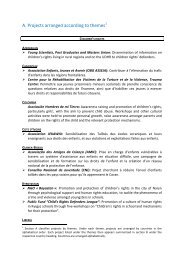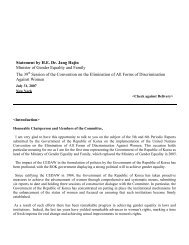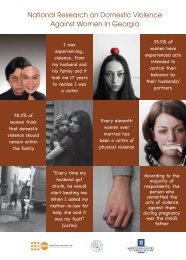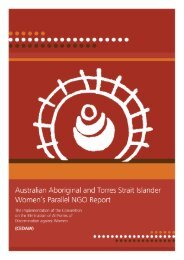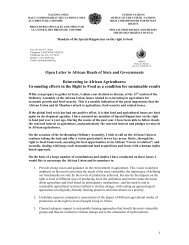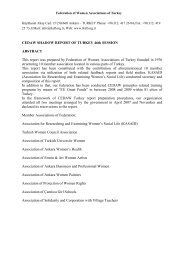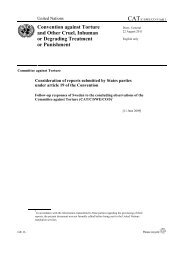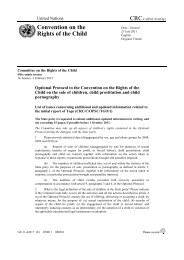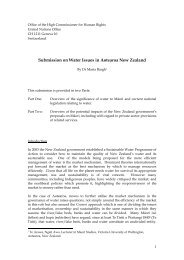Report - Office of the High Commissioner on Human Rights
Report - Office of the High Commissioner on Human Rights
Report - Office of the High Commissioner on Human Rights
- No tags were found...
Create successful ePaper yourself
Turn your PDF publications into a flip-book with our unique Google optimized e-Paper software.
Even where formal laws exist, people tend to abide by traditi<strong>on</strong>al and customary beliefs. There is still<br />
a persisting mentality that discriminates against women. For example, when men are approached about<br />
child maintenance, in relati<strong>on</strong> to <str<strong>on</strong>g>the</str<strong>on</strong>g>ir s<strong>on</strong>s <str<strong>on</strong>g>the</str<strong>on</strong>g>y will <str<strong>on</strong>g>of</str<strong>on</strong>g>ten say, “he is a boy he has got my land”; but<br />
for a girl <str<strong>on</strong>g>the</str<strong>on</strong>g>y will not say that.<br />
“I gave birth to a beautiful baby girl in July 2003. But as you have all heard, this was<br />
not good enough according to our law governing rights to land. Even <str<strong>on</strong>g>the</str<strong>on</strong>g> naming <str<strong>on</strong>g>of</str<strong>on</strong>g> my<br />
daughter is c<strong>on</strong>nected to land. To show our appreciati<strong>on</strong> to land gained through <str<strong>on</strong>g>the</str<strong>on</strong>g><br />
adopted family, I had to give <str<strong>on</strong>g>the</str<strong>on</strong>g>m <str<strong>on</strong>g>the</str<strong>on</strong>g> privilege <str<strong>on</strong>g>of</str<strong>on</strong>g> naming my eldest child. When we first<br />
arrived at our house, it was in a state to be demolished because it had been aband<strong>on</strong>ed<br />
when <str<strong>on</strong>g>the</str<strong>on</strong>g>y left for New Zealand. I wanted to live in a nice and adequate house, so I put<br />
in a lot <str<strong>on</strong>g>of</str<strong>on</strong>g> m<strong>on</strong>ey, stress and hard work to renovating <str<strong>on</strong>g>the</str<strong>on</strong>g> house. When my mo<str<strong>on</strong>g>the</str<strong>on</strong>g>r visited<br />
and I showed her what I had d<strong>on</strong>e, she said “Stop, d<strong>on</strong>’t renovate any fur<str<strong>on</strong>g>the</str<strong>on</strong>g>r”. The reas<strong>on</strong><br />
was because I did not have a s<strong>on</strong>. She explained if my husband were to drop dead today,<br />
I would have no rights to <str<strong>on</strong>g>the</str<strong>on</strong>g> house or land, and all <str<strong>on</strong>g>the</str<strong>on</strong>g> hard work would be wasted. As<br />
harsh as it sounded – it was actually <str<strong>on</strong>g>the</str<strong>on</strong>g> law that my mo<str<strong>on</strong>g>the</str<strong>on</strong>g>r was spelling out. I had<br />
to take into account what my mo<str<strong>on</strong>g>the</str<strong>on</strong>g>r said – it is in <str<strong>on</strong>g>the</str<strong>on</strong>g> law and <str<strong>on</strong>g>the</str<strong>on</strong>g> cultural ideology.”<br />
(‘Ofa–Ki-Levuka Guttenbeil-Likiliki, T<strong>on</strong>ga)<br />
The customary noti<strong>on</strong> that men are <str<strong>on</strong>g>the</str<strong>on</strong>g> head <str<strong>on</strong>g>of</str<strong>on</strong>g> <str<strong>on</strong>g>the</str<strong>on</strong>g> household poses a problem for women in <str<strong>on</strong>g>the</str<strong>on</strong>g> Pacific,<br />
and cannot be accepted any l<strong>on</strong>ger under <str<strong>on</strong>g>the</str<strong>on</strong>g> principles <str<strong>on</strong>g>of</str<strong>on</strong>g> gender equality. Article 15 <str<strong>on</strong>g>of</str<strong>on</strong>g> CEDAW<br />
guarantees equal rights <str<strong>on</strong>g>of</str<strong>on</strong>g> women and men in <str<strong>on</strong>g>the</str<strong>on</strong>g> family. The Beijing Platform for Acti<strong>on</strong> recognised<br />
diverse forms <str<strong>on</strong>g>of</str<strong>on</strong>g> family, <str<strong>on</strong>g>the</str<strong>on</strong>g>reby extending <str<strong>on</strong>g>the</str<strong>on</strong>g> benefits <str<strong>on</strong>g>of</str<strong>on</strong>g> rights bey<strong>on</strong>d traditi<strong>on</strong>al noti<strong>on</strong>s <str<strong>on</strong>g>of</str<strong>on</strong>g> family.<br />
However, this issue has not been sufficiently tackled by treaty committees or by human rights NGOs.<br />
In relati<strong>on</strong> to women’s rights to adequate housing, it is critical to keep in mind a broad definiti<strong>on</strong> <str<strong>on</strong>g>of</str<strong>on</strong>g><br />
family when developing housing rights indicators.<br />
Customary<br />
decisi<strong>on</strong>-making<br />
Traditi<strong>on</strong>ally, chiefs and traditi<strong>on</strong>al leaders in <str<strong>on</strong>g>the</str<strong>on</strong>g> Pacific have had a major role in resolving disputes<br />
<strong>on</strong> land, inheritance, property and housing. While applying traditi<strong>on</strong>al norms and standards, <str<strong>on</strong>g>the</str<strong>on</strong>g><br />
decisi<strong>on</strong>s <str<strong>on</strong>g>of</str<strong>on</strong>g>ten do not respect women’s rights.<br />
“Sera got married to Joe and moved to his village. Sera’s family got her a job in Sydney,<br />
Australia. A few m<strong>on</strong>ths later <str<strong>on</strong>g>the</str<strong>on</strong>g>y also found a job for <str<strong>on</strong>g>the</str<strong>on</strong>g> husband in Sydney. The couple<br />
worked and sent m<strong>on</strong>ey back home to his village and built <str<strong>on</strong>g>the</str<strong>on</strong>g> matrim<strong>on</strong>ial house for <str<strong>on</strong>g>the</str<strong>on</strong>g>m<br />
in Joe’s village. Sera returned to <str<strong>on</strong>g>the</str<strong>on</strong>g> village and <str<strong>on</strong>g>the</str<strong>on</strong>g> matrim<strong>on</strong>ial house. Joe remained in Sydney<br />
but started having an affair. Joe asked her to move out <str<strong>on</strong>g>of</str<strong>on</strong>g> <str<strong>on</strong>g>the</str<strong>on</strong>g> matrim<strong>on</strong>ial house and harassed<br />
her. She approached <str<strong>on</strong>g>the</str<strong>on</strong>g> Turaga-ni-koro, but <str<strong>on</strong>g>the</str<strong>on</strong>g>y told her to move out <str<strong>on</strong>g>of</str<strong>on</strong>g> <str<strong>on</strong>g>the</str<strong>on</strong>g> house because<br />
it was <str<strong>on</strong>g>the</str<strong>on</strong>g> husband’s village.” (Case Study ‘Sera’, Fiji Women’s Crisis Centre, Fiji)<br />
Informal systems <str<strong>on</strong>g>of</str<strong>on</strong>g> governance, such as <str<strong>on</strong>g>the</str<strong>on</strong>g> Great Council <str<strong>on</strong>g>of</str<strong>on</strong>g> Chiefs in Fiji, govern <strong>on</strong> <str<strong>on</strong>g>the</str<strong>on</strong>g> basis <str<strong>on</strong>g>of</str<strong>on</strong>g> traditi<strong>on</strong>al<br />
ideals. They c<strong>on</strong>sist mostly <str<strong>on</strong>g>of</str<strong>on</strong>g> men with c<strong>on</strong>servative views that <str<strong>on</strong>g>of</str<strong>on</strong>g>ten discriminate against women and<br />
sometimes pose obstacles to women’s development. For example, in Vanuatu <str<strong>on</strong>g>the</str<strong>on</strong>g> Nati<strong>on</strong>al Council <str<strong>on</strong>g>of</str<strong>on</strong>g><br />
Chiefs is a c<strong>on</strong>stituti<strong>on</strong>al body with a formal budget allocati<strong>on</strong>. It has a str<strong>on</strong>g influence <strong>on</strong> <str<strong>on</strong>g>the</str<strong>on</strong>g> government<br />
and due to its patriarchal leanings, could impede <str<strong>on</strong>g>the</str<strong>on</strong>g> realisati<strong>on</strong> <str<strong>on</strong>g>of</str<strong>on</strong>g> women’s human rights.<br />
42 WOMEN’S RIGHTS TO ADEQUATE HOUSEING AND LAND




